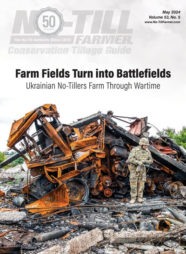A few weeks ago, several readers indicated that National Resource and Conservation Service (NRCS) staffers in Nebraska are against funding strip-till projects. Instead, they’re attempting to make pure continuous no-till the favored tillage system.
Promoting no-till is fine, but not to the extent that it takes away one of the options some growers favor for warming up cold soils, producing efficient yields and saving valuable soil.
After contacting officials in the Nebraska NRCS office, we learned the No-Till Farmer readers were right. Here’s what the Nebraska NRCS folks told us regarding strip-till:
“At this time, we do not pay for strip-till. These tools generally disturb too much of the surface (often more than 30% of the row width, which wouldn’t even qualify as strip-till according to our standard) and can cause some additional erosion problems on sloping ground.
“Granted, they are better than mulch-till or conventional till, but we feel that continuous no-till is superior. It should also be noted that we do not allow the use of vertical-tillage equipment in no-till. These tools also tend to disturb too much soil and are considered full-width tillage.”
Despite what’s occurring in Nebraska, other states see plenty of potential for both strip-till and no-till as valuable conservation practices.
And the first thing most no-tillers agree on is that there’s no universal tillage system that is best for all soils, all fields and all growers. Unfortunately, some federal employees apparently haven’t gotten this message.
For instance, among attendees at last winter’s National No-Tillage Conference, 78% are using pure no-till, 10% use strip-till, 6% use vertical tillage, 3% use zone-tillage and 3% use a fluffing harrow system.
The concern with the Nebraska regulators is that there appears to be a basic technical issue as to whether strip-till is really considered no-till, which it definitely is under the national guidelines. Yet these government folks have the power to dictate the conditions under which financial assistance is offered. In the case of Nebraska, they’ve made the no-till standard more restrictive than the national standard and thus decided against funding strip-till through the EQIP program.
While full-width tillage is not allowed under the national no-till standard, strip-till, zone-till and rigs for injecting anhydrous ammonia and manure are allowed.
Although rotary harrows and vertical-tillage units are not considered no-till with the RUSLE soil-loss production tool, they’re still given proper credit for predicting soil losses.
With advice from the state technical committee each state can create their own EQIP payment scenarios as long as they follow NRCS policy guidelines and don’t break any federal laws. While growers can argue about the technical validity of the state conservationist’s reasons and decisions regarding strip-till, he or she has the final word.
NRCS payments are designed to incentivize priority practices and systems that the state conservationist and his staff believe will advance conservation. The payment scenarios can also be bundled together to sweeten the incentive for farmers.
As an example, a state program staff could create a payment scenario for strip-till that also requires contour farming, strip cropping and contour buffer strips to address sloping ground issues. Or the staff could bundle vertical tillage for manure incorporation with an otherwise 100% no-till system and create an entirely different EQIP payment scenario.
Since NRCS payment plans must be science based, growers, manufacturers and educators need to make the case for approving strip-till. Any system that scientifically demonstrates effective conservation of soil, air and water should be OK. So, this sounds like there’s a need for a serious strip-till educational effort in Nebraska.
Sometimes government folks rely too heavily on the advice of university educators who may be following their own agenda. So it’s essential that your voice be heard for funding strip-till, vertical tillage, no-till and other soil-saving conservation practices.
The squeaky wheel tends to be the one that gets the grease. Right now in Nebraska, strip-till is rubbing some folks the wrong way and is not getting the attention it deserves.






Post a comment
Report Abusive Comment